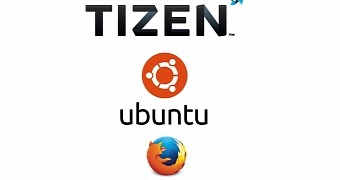Android, iOS and Windows Phone might be mobile operating systems du-jour, but the fast evolution of the ecosystem might change how things look in a few years from now.
This trend can be observed in recent events which unfolded during the last days at MWC 2015 in Barcelona.
For example, Finnish company Jolla, that produced its own software alternative called Sailfish, has just announced it is opening the licensing gates for its latest Sailfish 2.0, encouraging other phone manufacturers to pick up and use the platform.
Sailfish OS currently comes pre-installed solely on Jolla’s products, but that might change soon enough. Like Jolla, other less mainstream mobile operating systems like Firefox, Ubuntu and Tizen are looking to become a larger presence on the market.
Firefox, Ubuntu and Tizen will slowly start making their way on high-end phones
Firefox OS has seen a slow start on mobile phones, but this week in Barcelona we have seen companies like ZTE, Alcatel and LG show off new entry-level models running on this particular platform. And soon, we could even expect to see Firefox OS power more advanced models. After all, Ubuntu has already started doing it.
Ubuntu is making a strong entry into the smartphone ecosystem, with companies like BQ and Meizu being two of the first OEMs to produce such models.
Meizu’s phone is a high-end device taking advantage of a MediaTek octa-core A17 2.2GHz x 4 and A7 1.7GHz x 4 processor customized by the company and working in concert with 2GB of RAM.
The handset has a 5.36-inch display with 1920 x 1152 resolution powered by Corning Gorilla Glass, a 20.7MP rear camera and a 2MP frontal camera.
As for Samsung, the Korean tech giant focused on launching the Galaxy S6 and Galaxy S6 Edge at the event in Barcelona, but a few months prior to MWC 2015, the company rolled out its first Tizen OS-powered smartphone, called the Z1, in India, marketing it for a highly affordable sub-$100 / €78 price tag.
However, word on the street has it that Samsung is gearing up to produce a second-gen Tizen phone, but this time it will be of the high-end variety.
LG electronics is also using an alternate OS for some of its products. For example, the LG Watch Urbane LTE is sustained by Web OS, but we should expect to see the platform power some of the company’s future phones too.
After all, we did hear that the next-gen LG G4 would be completely different from the current LG G3. Is the company planning an OS makeover? It’s a possibility.
With the rise of high-end smartphones running on alternate mobile platforms, customers might get the needed push to step away from platforms such as Android or iOS.

 14 DAY TRIAL //
14 DAY TRIAL //